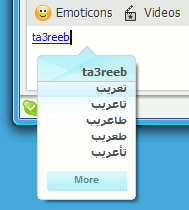 Google Friend connect, the online service by Google that allows users on the internet to connect with their friends on different websites, and aiming to expand the notions of social networking throughout the web, has just announced that the service is now available in Arabic, in addition to another 46 languages.
Google Friend connect, the online service by Google that allows users on the internet to connect with their friends on different websites, and aiming to expand the notions of social networking throughout the web, has just announced that the service is now available in Arabic, in addition to another 46 languages.
According to Google, over 5 million sites are currently using Google Friend Connect to connect and build their communities, and this step aims to make it easier for site owners who prefer to use other languages than English to implement the system on their sites and take advantage of it.
The main Google Friend Connect site is now available in all the newly added languages, making the setup of sites easier for webmasters more comfortable with those languages; and through the interface webmasters can specify the language of their site, and have most Google-created gadgets they’ll be using automatically rendered in that language.
Other than Arabic, Friend Connect is now also available in Bengali, Bulgarian, Catalan, Chinese, Croatian, Czech, Danish, Dutch, English, Filipino, Finnish, French, German, Greek, Gujarati, Hebrew, Hindi, Hungarian, Indonesian, Italian, Japanese, Kannada, Korean, Latvian, Lingala, Lithuanian, Malay, Malayalam, Marathi, Norwegian, Oriya, Persian, Polish, Portuguese, Romanian, Russian, Serbian, Slovak, Slovenian, Spanish, Swedish, Tamil, Telugu, Thai, Turkish, Ukrainian, and Vietnamese.
For more details or to start using the service, check out: google.com/friendconnect.
Developers working on OpenSocial applications and gadgets for Friend Connect can check out the documentation on localizing OpenSocial applications.
 Google just announced the addition of a new domain to their list of international domain names google.ps for Palestine.
Google just announced the addition of a new domain to their list of international domain names google.ps for Palestine.







